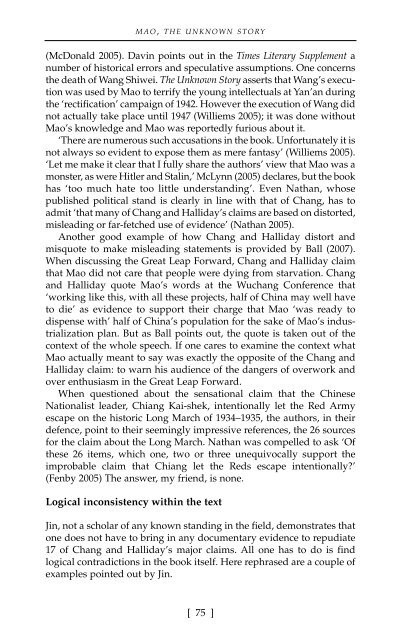Battle for China's Past : Mao and the Cultural Revolution
Battle for China's Past : Mao and the Cultural Revolution
Battle for China's Past : Mao and the Cultural Revolution
You also want an ePaper? Increase the reach of your titles
YUMPU automatically turns print PDFs into web optimized ePapers that Google loves.
MAO, THE UNKNOWN STORY<br />
(McDonald 2005). Davin points out in <strong>the</strong> Times Literary Supplement a<br />
number of historical errors <strong>and</strong> speculative assumptions. One concerns<br />
<strong>the</strong> death of Wang Shiwei. The Unknown Story asserts that Wang’s execution<br />
was used by <strong>Mao</strong> to terrify <strong>the</strong> young intellectuals at Yan’an during<br />
<strong>the</strong> ‘rectification’ campaign of 1942. However <strong>the</strong> execution of Wang did<br />
not actually take place until 1947 (Williems 2005); it was done without<br />
<strong>Mao</strong>’s knowledge <strong>and</strong> <strong>Mao</strong> was reportedly furious about it.<br />
‘There are numerous such accusations in <strong>the</strong> book. Un<strong>for</strong>tunately it is<br />
not always so evident to expose <strong>the</strong>m as mere fantasy’ (Williems 2005).<br />
‘Let me make it clear that I fully share <strong>the</strong> authors’ view that <strong>Mao</strong> was a<br />
monster, as were Hitler <strong>and</strong> Stalin,’ McLynn (2005) declares, but <strong>the</strong> book<br />
has ‘too much hate too little underst<strong>and</strong>ing’. Even Nathan, whose<br />
published political st<strong>and</strong> is clearly in line with that of Chang, has to<br />
admit ‘that many of Chang <strong>and</strong> Halliday’s claims are based on distorted,<br />
misleading or far-fetched use of evidence’ (Nathan 2005).<br />
Ano<strong>the</strong>r good example of how Chang <strong>and</strong> Halliday distort <strong>and</strong><br />
misquote to make misleading statements is provided by Ball (2007).<br />
When discussing <strong>the</strong> Great Leap Forward, Chang <strong>and</strong> Halliday claim<br />
that <strong>Mao</strong> did not care that people were dying from starvation. Chang<br />
<strong>and</strong> Halliday quote <strong>Mao</strong>’s words at <strong>the</strong> Wuchang Conference that<br />
‘working like this, with all <strong>the</strong>se projects, half of China may well have<br />
to die’ as evidence to support <strong>the</strong>ir charge that <strong>Mao</strong> ‘was ready to<br />
dispense with’ half of China’s population <strong>for</strong> <strong>the</strong> sake of <strong>Mao</strong>’s industrialization<br />
plan. But as Ball points out, <strong>the</strong> quote is taken out of <strong>the</strong><br />
context of <strong>the</strong> whole speech. If one cares to examine <strong>the</strong> context what<br />
<strong>Mao</strong> actually meant to say was exactly <strong>the</strong> opposite of <strong>the</strong> Chang <strong>and</strong><br />
Halliday claim: to warn his audience of <strong>the</strong> dangers of overwork <strong>and</strong><br />
over enthusiasm in <strong>the</strong> Great Leap Forward.<br />
When questioned about <strong>the</strong> sensational claim that <strong>the</strong> Chinese<br />
Nationalist leader, Chiang Kai-shek, intentionally let <strong>the</strong> Red Army<br />
escape on <strong>the</strong> historic Long March of 1934–1935, <strong>the</strong> authors, in <strong>the</strong>ir<br />
defence, point to <strong>the</strong>ir seemingly impressive references, <strong>the</strong> 26 sources<br />
<strong>for</strong> <strong>the</strong> claim about <strong>the</strong> Long March. Nathan was compelled to ask ‘Of<br />
<strong>the</strong>se 26 items, which one, two or three unequivocally support <strong>the</strong><br />
improbable claim that Chiang let <strong>the</strong> Reds escape intentionally?’<br />
(Fenby 2005) The answer, my friend, is none.<br />
Logical inconsistency within <strong>the</strong> text<br />
Jin, not a scholar of any known st<strong>and</strong>ing in <strong>the</strong> field, demonstrates that<br />
one does not have to bring in any documentary evidence to repudiate<br />
17 of Chang <strong>and</strong> Halliday’s major claims. All one has to do is find<br />
logical contradictions in <strong>the</strong> book itself. Here rephrased are a couple of<br />
examples pointed out by Jin.<br />
[ 75 ]
















